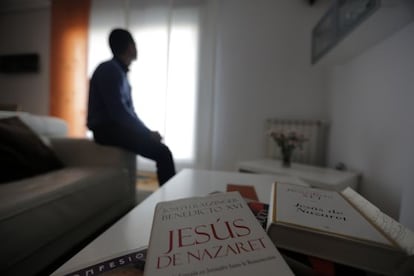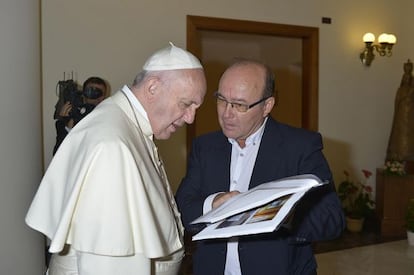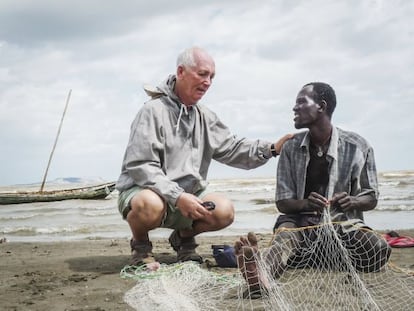“I was a sexual slave for depraved people protected by bishops”
Testimony by ex-member of missionary group MCSPA is now in the hands of the pope

“Publish it.” The two words were an entreat (or perhaps an order) made by Pope Francis to the theologian José Manuel Vidal, when the latter handed him a folder containing information about alleged sexual abuses at an organization of religious and lay people created in Barcelona.
The Missionary Community of Saint Paul the Apostle and of Mary, Mother of the Church (MCSPA in its English acronym) has since extended to other countries in Africa and Latin America, where the association carries out significant development work besides its religious outreach.
At this point I only trust the pope. It hurts me that I lacked the guts to report it before this”
Paulino, alleged victim of abuse
The founders of MCSPA had already been reprimanded by the Archbishop of Barcelona in 1995. But now, new testimony in the hands of the pope seems to confirm the existence of widespread sexual abuse within the group.
“I have been a labor slave and a sexual slave for a group of depraved people, who were protected by Church officials,” writes one of the alleged victims, now 36, in his letter to the pope.
“In the three years I spent at the mission in Nariokotome, in Kenya, I was treated like a beast of burden. There were around 30 people, and on top of the slave work there was the sexual slavery. They would tell us that an active sexual life is something that God wants, and that He also wants us to go around naked, because that is the way He made us. Help me, Francis. Soothe my broken soul a little. Don’t let other youths endure this hell.”

While it is not the only claim against the MCSPA that has been sent to the Vatican, this one is particularly significant because there is no doubt that it reached the hands of the pope. Two other powerful testimonies, by a young man and a young woman, seem to have gotten lost along the way.
Paulino (an assumed name) describes the MCSPA as “a perfect engineering work of evil” and suggests that the Vatican is dealing with a new Maciel case, in reference to the founder of the Legion of Christ, Marcial Maciel, who secured the silence of countless Church officials for decades and managed to carry on with his sexual abuse without anyone stopping him – not even Pope John Paul II.
Then, as now, ecclesiastical authorities look the other way or claim that they have passed the complaints along to their own superiors, and say they can do no more.

Several individuals named in the folder that Pope Francis now has in his power vehemently denied the accusations against them when EL PAÍS showed them the report.
“We have never seen that camp of horrors that Paulino describes,” said the priest and doctor Pablo Cirujeda.
Similar views were expressed by Dominick Kimengich, the bishop who issued the license allowing MCSPA to operate in Kenya. In a letter to EL PAÍS, the prelate states that “I am aware of several accusations that were put to the Congregation for the Doctrine of the Faith and to the Pontifical Council for the Laity, but they seem to involve events that were investigated in 2006.”
“Don’t let this happen to others”
Paulino exhibits extreme precaution in his meeting with this reporter. What he had to say, he has already said in seven pages that are now in the hands of Pope Francis. His written statement is dry, almost notary-like.
“At this point I only trust the pope. It hurts me that I lacked the guts to report it before this,” he says. “It hurts that all these years that I felt unable to speak out, more boys and girls have been abused. I am not afraid anymore. But I do have long-term damage. After living adrift from God, you no longer feel anything. Now all I want is for what happened to me not to happen to others. I hope the hierarchy finally reacts. A lot of bishops are aware of this. They don’t do anything, some because they don’t want to complicate their lives, others for money. I myself told a bishop, and he ignored me. God will judge him as he will judge me.”
Founded and promoted by the Spaniards Francisco Andreo, Albert Salvans and Pere Cané, the MCSPA has been under scrutiny in the past. In 1995 there was a criminal complaint against the group for abuse of minors and statutory rape. The complaint also asked for the archbishop of Barcelona, Cardinal Narcís Jubany, and four aides to be prosecuted for covering up the crimes.
The case even made it to the Catalan parliament. But political pressure and Jubany’s prestige resulted in the criminal case being shelved and the Church investigation ending with the claim that the suspects would not be ordained priests.
In reality, Francisco Andreo was already a priest and received no punishment. Instead, he left Barcelona to lead the MCSPA’s efforts in Africa and the United States. With him were Salvans and Cané, acting as priests even though the Barcelona bishopric had “reduced them to the state of lay people,” according to a spokesperson for that Church body. But documents provided by Pere Cané contradict this version of events.
Support from a priest
Paulino is not alone in his battle against sexual abuse in the Catholic Church. He is backed by a Spanish priest named Fidel Blasco Canalejas.
Ordained in 1984, Blasco studied in Rome and feels at ease in high-powered circles. This man has worked hard to make sure these claims by alleged victims of abuse reach the desks they should. Year after year, he has written dozens of letters to cardinals and bishops, demanding answers but getting none.
But now Blasco is hopeful. Finally, Paulino’s file is in the pope’s hands, and Blasco is sure that some prelates are not going to be enthusiastic about it.
“Why such fear of the truth, why so long before we end the suffering of so many people?” asks Blasco, who heads a large church in Guadalajara and teaches at Alcalá University.
Francisco Andreo died of cancer in 2013, but before that, in 2008, the MCSPA had broken up and lost all its US headquarters. The association’s activity was reduced to missions in Africa, with Salvans at the helm, while Cané and 27 other missionaries founded a new group called the Community of Saint Paul (CSP), based in Racine (Wisconsin) and radically cut off from their former colleagues.
Paulino is barely able to talk about that past. He hands over documents and keeps mostly quiet.
“To the fear, they added an intelligent brainwashing process,” he says. “You’re living in a desert, in a foreign country, without a passport, without any documents or money. You rely on them for everything, completely. You are their slave, and they abuse you. First they rip you away from your family. Then they make you believe you’re a piece of shit and that your job is to obey blindly.”
“Francisco Andreo would organize orgies with men and women, where he sometimes actively participated and other times watched as a missionary woman fornicated with two black men,” he recalls.
“When he wanted sex, Andreo would call a boy in to his room. The day he called for me, I arrived expecting the worst. He offered me coffee and asked us to be left alone. He ordered me to undress. I sat down in a chair, but he made me lie down on the bed. He started talking to me about sex, and asked me whether that got me hard. Later he started touching me. Seeing me so nervous, and that my penis was not responding to his handling, he called me moralistic, he insulted me and kicked me out of his room. I walked out with a broken soul – the scene is branded in my memory forever.”
English version by Susana Urra.
Tu suscripción se está usando en otro dispositivo
¿Quieres añadir otro usuario a tu suscripción?
Si continúas leyendo en este dispositivo, no se podrá leer en el otro.
FlechaTu suscripción se está usando en otro dispositivo y solo puedes acceder a EL PAÍS desde un dispositivo a la vez.
Si quieres compartir tu cuenta, cambia tu suscripción a la modalidad Premium, así podrás añadir otro usuario. Cada uno accederá con su propia cuenta de email, lo que os permitirá personalizar vuestra experiencia en EL PAÍS.
¿Tienes una suscripción de empresa? Accede aquí para contratar más cuentas.
En el caso de no saber quién está usando tu cuenta, te recomendamos cambiar tu contraseña aquí.
Si decides continuar compartiendo tu cuenta, este mensaje se mostrará en tu dispositivo y en el de la otra persona que está usando tu cuenta de forma indefinida, afectando a tu experiencia de lectura. Puedes consultar aquí los términos y condiciones de la suscripción digital.








































